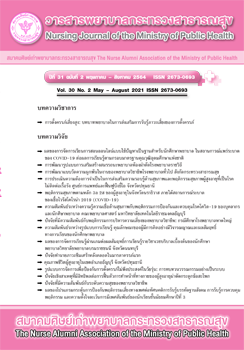The Relationships among Learning Styles, Critical Thinking Deposition and Learning Achievement of Nursing Students
Main Article Content
Abstract
The objective of this descriptive research was to study the relationship among learning styles, critical thinking dispositions, and learning achievement. The population was the 250 nursing students of Suan Dusit University studying in Years 1-4 of the Nursing bachelor’s degree. The data were collected by a 3 part questionnaires, including demographic data, class, learning achievement, critical thinking deposition, and learning styles. Cronbach’s alpha coefficients were .84, and .87, respectively. The data were analyzed by descriptive statistics, Spearman’s Rank Correlation Coefficient, and Kruskal-Wallis tests. The results showed that mean age of the sample was 20.3 years (SD=1.72) and grade point average was 3.00-3.50. Most of the students were freshmen. The 4th year students had the highest median score for overall scores of critical thinking deposition (median=225) and for the categories of systematicity (median=37), analyticity (median=32), and inquisitiveness (median=31). Students in different years of study were not different in their learning styles. in the two main styles were dependent style and independent style. There was a positive significant relationship between competitive style and critical thinking deposition in overall dimensions (r=.21, p<.01), inquisitiveness (r=.14, p<.05), maturity (r=.15, p<.05), and truth-seeking (r=.23, p<.01), whereas learning achievement was not found to be statistically significant. The findings support teaching and learning methods with group discussions, the sharing of ideas, and team work, will develop critical thinking among nursing students.
Article Details
บทความและรายงานวิจัยในวารสารพยาบาลกระทรวงสาธารณสุข เป็นความคิดเห็นของ ผู้เขียน มิใช่ของคณะผู้จัดทำ และมิใช่ความรับผิดชอบของสมาคมศิษย์เก่าพยาบาลกระทรวงสาธารณสุข ซึ่งสามารถนำไปอ้างอิงได้
References
a case of secondary school level. Journal of quality and technology management.2011;7(2):1-14.
2. Gordon C, Williams S, Hudson G, Stewart J. Factors associated with academic performance of physical therapy students. West Indian Med J.2010;59(2):203-8.
3. Raymond C, Profetto-McGrath J, Myrick F, Strean WB. Nurse educators’ critical thinking: A mixed methods exploration. Nurse education today.2018;66:117-22.
4. Abdollahi AAV, FathiAzar A, Abdollahi N. The relationship of critical thinking with creativity, self-efficacy beliefs and academic performance of teacher–students. Journal of Research in School and Virtual Learning, 2015;2(7),41–52.
5. Office of education council Ministry of education. National Education Plan B.E 2017-2038 [internet]. 2018. Available from: http://www.lampang.go.th/public60/EducationPlan2.pdf
6. Pour-Mohammadi M, Zainol Abidin MJ, Yang Ahmad KAB. The relationship between students’ strengths in multiple intelligences and their achievement in learning english language. Journal of Language Teaching & Research.2012;3(4).
7. Sripongplerd P. Learning styles and teaching styles. Thaksin University Library Journal 2017;6:1-23.(in Thai).
8. Riechmann SW, Grasha AF. A rational approach to developing and assessing the construct validity of a student learning style scales instrument. The Journal of Psychology.1974;87(2):213-23.
9. Balsiri N. Factors affecting critical thinking of undergraduate students: an application of the multilevel growth mixture model [Doctoral Dissertation]. Bangkok. Chulalongkorn University.2010.(in Thai).
10. Ashoori J. Relationship between academic achievement and self-efficacy, critical thinking, thinking styles and emotional intelligence in nursing students. 2014. Available from: https://www.sid.ir/en/Journal/ViewPaper.aspx?ID=436575
11. Ghazivakili Z, Nia RN, PANAHI F, Karimi M, Gholsorkhi H, Ahmadi Z. The role of critical thinking skills and learning styles of university students in their academic performance. Journal of advances in medical education & professionalism.2014;2(3):95.
12. Aghaei N, Souri R, Ghanbari S. Comparison of the relationship between critical thinking and academic achievement among physical education students and students in other fields of study in Bu Ali Sina University, Hamedan.2012.
13. Aghaei N, Souri R, Ghanbari S. Comparison of the relationship between critical thinking and academic achievement among physical education students and students in other fields of study in Bu Ali Sina University, Hamedan.2012.
14. Faul F, Erdfelder E, Lang A-G, Buchner A. G* Power 3: A flexible statistical power analysis program for the social, behavioral, and biomedical sciences. Behavior research methods.2007;39(2):175-91.
15. Poungjuntaradej N, Pleankaew P. Factors related to nursing students’ critical thinking, Police Nursing College. Journal of the Police Nurses.2016;8(1):125-35.
16. Shirazi F, Heidari S. The relationship between critical thinking skills and learning styles and academic achievement of nursing students. The Journal of Nursing Research.2019;27(4):e38.
17. Visudtibhan PJ, Disorntatiwa P. Learning Style Preferences of Nursing Students at Ramathibodi School of Nursing, Faculty of Medicine, Ramathibodi Hospital, Mahidol University. Nursing Journal of the Ministry of Public Health.2015;25(1):70-82.
18. Gurpinar E, Alimoglu MK, Mamakli S, Aktekin M. Can learning style predict student satisfaction with different instruction methods and academic achievement in medical education? Advances in Physiology Education.2010;34(4):192-6.
19. Pai H-C, Eng C-J. The relationships among critical thinking disposition, caring behavior, and learning styles in student nurses.2013;3:249-56.
20. Yimyuan W. A meta-analysis of factors related to critical thinking. [Master thesis]. Bangkok. Chulalongkorn University 2004.(in Thai).
21. An GJ, Yoo MS. Critical thinking and learning styles of nursing students at the baccalaureate nursing program in Korea. Contemporary Nurse.2008;29(1):100-9.
22. Dilekli Y. The relationships between critical thinking skills and learning styles of gifted students. European Journal of Education Studies.2017

